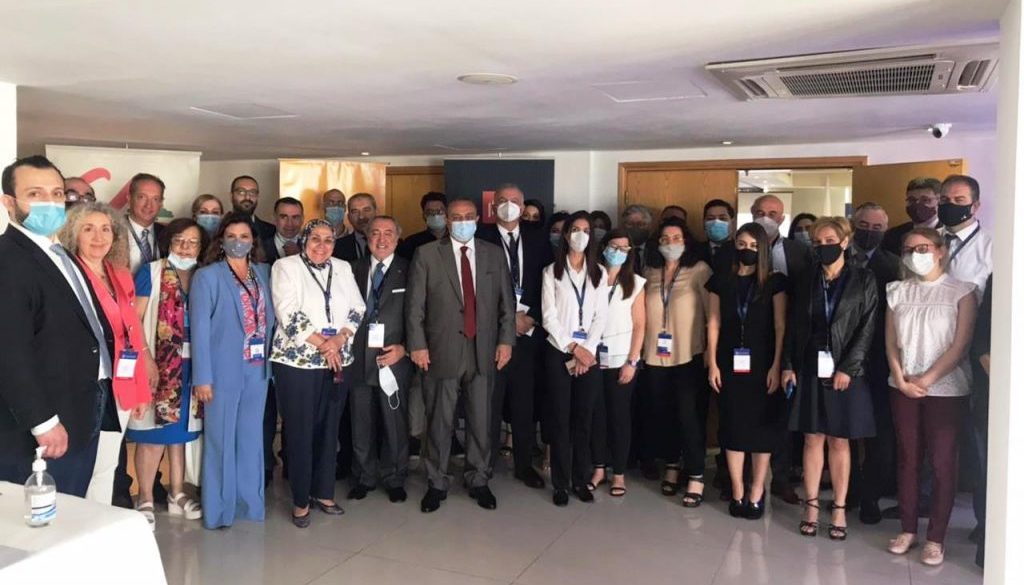Investigating the Global Decline in Correspondent Banking Relationships & Complying with AMLD6 and AMLA 2020
Overview
The World Union of Arab Bankers under the support and participation of the Central Bank of Cyprus and in cooperation with the Association of Banks organized a Forum entitled “The Seventh Annual Arab – Cypriot Forum: Investigating the Global Decline in Correspondent Banking Relationships & Complying with AMLD6 and AMLA 2020”
The event was held at Golden Bay Beach Hotel, Larnaca – Cyprus during the period 17-18 June, 2021 and was attended by prominent bankers and financiers from the Arab and Cypriot banking sector.
This year’s event comes in-line with WUAB’s efforts to maintain and further develop the flourishing cooperation with the Cypriot banking and financial sector for the seventh consecutive year and based on the enormous success witnessed by the previous forum entitled “The Sixth Annual Arab – Cypriot Forum: AML/CFT Compliance with International Regulations and Adopting MONEYVAL’s Principles & Recommendations”.
The Seventh Annual Arab – Cypriot Forum was sponsored by Astrobank and Credit Libanais.
Opening Ceremony
The event was inaugurated with and opening ceremony where speeches were delivered by Mr. Michael Kammas, Director General of the Association of Cyprus Banks, Cyprus, Mr. Wissam H. Fattouh, Secretary General, Union of Arab Banks and World Union of Arab Bankers, Dr. Shadi Karam, Chairman of the Board of Directors, Astro Bank, Cyprus, Mr. Marios Tannousis, Deputy Director General, Cyprus Investment Promotion Agency, Cyprus, and H.E. Mr. Constantinos Herodotou, Governor, Central Bank of Cyprus to whose speech was delivered via zoom by Mr. Marios Neoptolemou, Assistant Director, AML/CFT, Financial Conduct and Supervision of Investment Services Department, Central Bank of Cyprus.
Speech by Mr. Wissam Fattouh, Secretary General, World Union of Arab Bankers and Union of Arab Banks
Good morning ladies and Gentlemen,
I would like to begin by expressing how pleased I am that we are finally moving forward with recovery efforts from the pandemic with improvement in health conditions and better travel restrictions which provided us the ability to convene physically here in Cyprus that has welcomed us and presented the opportunity of intellectual and social closeness while adhering with international guidelines and precautionary standards.
I would like to express my thanks and appreciation to H.E. Governor Herodotou represented by Mr. Neoptolemou, Mr. Kammas, Mr. Tannnousis, and our Colleagues from the Central Bank of Cyprus, the Association of Cyprus Banks and Cyprus Investment Promotion Agency for their continuous cooperation with the Arab banks and their representative organizations to support the Cypriot-Arab banking relations and the Arab banking community presently active in Cyprus.
I also wanted to extend special thanks to a long-time colleague in the Lebanese and Arab banking spectrum and an international banking professional whom I am also proud to call my friend – Dr. Shadi Karam. Dr. Karam represented the Lebanese banking sector in the finest manners in Union of Arab Banks events and meetings regionally and internationally, whereby I have learnt a lot from him and his expertise which are highly sought after, and who is driving Astrobank further upwards.
Ladies and gentlemen,
Combating money laundering and terrorism financing is an essential matter and a serious concern for the entire globe, as the committers of organized crime and illegal financial activities dedicate all their skills and capabilities to penetrate the global banking systems. This has made the banking systems one of the most important “battlefields” against money laundering and terrorism financing.
The effective application of anti-money laundering and terrorist financing laws and regulations requires the exploitation of all available knowledge, expertise, and competencies by all concerned sectors and institutions, which necessitates the availability of qualified and well trained human resources, whether working in law enforcement agencies, banks and financial institutions, or central banks and regulatory and supervisory authorities. Consequently, our Forum today aims to be a platform for AML/CFT capacity building and promoting compliance culture and practices.
Moreover, in order for anti-money laundering and terrorist financing measures to be effective, everyone must understand the risks and weaknesses that can be exploited by criminal and terrorists to penetrate the financial system defense lines. Moreover, the compliance with anti-money laundering and terrorist financing laws and regulations in financial institutions requires a high commitment at all levels.
Ladies and gentlemen,
The Union of Arab Banks and the World Union of Arab Bankers have a long history of coordinating the regional efforts to protect the Arab financial sector and the broader economy from the risk of leakage of dirty money. In this regard, the two organizations have organized and executed over the past decade a very large number of national, regional and international activities, to raise the awareness among Arab banks and financial institutions about the repercussions of money laundering and terrorist financing risks on the Arab economies and societies, and to take the necessary protection measures.
Ladies and gentlemen,
The World Union of Arab Bankers seeks to tighten the bonds between the Arab banks and the Cypriote banks and the Cyprus central bank. This is based on the long-history economic, financial, banking, investment, and trade relationships between Cyprus and the Arab countries. Particularly, the presence of a large number of Arab banks – mainly Lebanese banks – in Cyprus, and the Lebanese investments in Cyprus, which consider the Island as their second home. Therefore, we aimed from this Forum to exchange with our colleagues from the Cypriot banking system the views and experiences about AML concerns, views and experiences.
Ladies and gentlemen,
I thank you again for your presence and I hope we all will benefit from the presentations and the discussions, to boost our knowledge about AML, and particularly about the new global AML rules and regulations.
Thank you for your attention.
Speech by Dr. Shady Karam, Chairman of the Board of Directors, Astrobank
Good morning Ladies and gentlemen,
I would like to thank the World Union of Arab Banks, in particular Mr. Wissam Fattouh, its Secretary General and through him, its Chairman, Sheikh Mohamed El Jarrah El-Sabbah and Secretary General, for inviting me, and I would like to welcome them to Cyprus.
I am thankful for the opportunity to participate in this meeting organized on what I consider a crucial theme today for small and midsize banks especially those in smaller markets like Cyprus.
As you will most certainly hear from the distinguished speakers in the following two days, correspondent banking is the cornerstone of the global payment system. It is designed to serve the settlement of financial transactions across borders.
It allows companies and individuals to safely move money around the world and supports and encourages global trade.
It is mapped by using corridors, i.e. flows of cross-border messages and correspondent banking relationships with given money-center banks. Over the last seven years, active relationships in the global correspondent-banking network have declined by about 20% and the number of active corridors has fallen by roughly 10%.
All the research demonstrates that since the 14th century in Venice to the second wave of globalization in the late 20th century, correspondent banking and global trade cross-fertilize each other’s growth. It is as though one is the condition of success for the other.
Then, the de-risking tsunami struck. Correspondents panicked.
Over the past decade, correspondent banks have been retreating. Cost-effectiveness and risk were used as arguments to justify the retreat.
After the financial crisis, tighter regulations (increasingly costly to implement) and regulatory penalties (USD 220 Billion paid since 2018. BoA alone paid 76 Billion. Great source of revenue for US Treasury and NYC) have discouraged correspondent banks from pursuing their operations in many markets considered as insufficiently aligned with international compliance standards and insufficiently lucrative to warrant the risk.
Overall, research shows that there is a significant fall in global correspondent banking relationships since the crisis.
Closer to us:
Minus 34% in Cyprus by 2018 with a decrease in value of 71% and a fall in the number of payments of 40%!!!!
Minus 22% in Saudi Arabia!
Minus 20% in the UAE!
If we want to be in line with the FATF (Financial Action Task Force, a watchdog) standards, “De-Risking” should never be an excuse for the private sector to avoid implementing a risk-based approach,
This has been emphasized by the FATF on a number of occasions, clarifying that the Standards require the application of a case-by-case risk-based approach, as opposed to wholesale de-risking.
Many western banks, though, have dismissed entire regions and countries – and the impact in terms of financial exclusion that this is having in some parts of the world has been identified as a serious social threat by the G20 nations and World Bank among others.
De-risking by Western banks has several consequences:
- It left a gap in the market in some regions and the signs are that eastern financial institutions, predominantly Chinese banks, are moving to fill the gap. Correspondent banking relationships operated by Chinese banks increased over 30 times since 2009. These trends suggest a continued shift in correspondent banking relationships from West to East.
- Cross border transactions, as you know, are predominantly conducted in USD. But, research shows a close to 20% fall in US dollar correspondent relationships since 2013 with the acceleration of the de-risking movement and the introduction of the sanctions policy.
This will undoubtedly have a twin effect: negative on the dollar and positive on other currencies, notably the renmimbi.
- Correspondent relationships transacting in euros have also declined, by 23% since 2009, but this is partly due to the integration of cross border payments across Europe into the Single European Payments Area (SEPA).
- Reducing their correspondent banking relationships as they shun high-risk countries or regions, has generated for money center banks a loss of banking services revenue as a result.
- By moving to more lenient regulatory environments, banks are dragging money flows out to risky settings.
‘The irony is that regulation designed to protect the global financial system is, in a sense, having an opposite effect and forcing whole regions outside the regulated financial system.’
- Correspondent banking has become more concentrated, to the potential detriment of market integrity, financial inclusion and economic prosperity. If entire customer segments lose access to these financial services, then trade, investment, remittances, economic growth and sustainable development itself may be endangered.
So, what is the ‘antidote’ to blanket de-risking?
- It is for correspondent banks to adopt a more granular approach to risk assessment and due diligence, which can securely and quickly determine the risk of a transaction in a high-risk region. Technology is a determining cost-effective tool in this exercise.
- Local banks also have some homework to do in order to demonstrate that they meet international compliance standards, because they have the right compliance systems, the right processes and the right culture in place. They have to show that they can be trusted to act as local correspondent banking partners for the large international clearing banks.
‘Since the financial crash of 2008, we have seen significant commitment from financial institutions in emerging economies to demonstrate that they are not high risk.” Often trading off profitability and sacrificing client relations.
- On the authorities side, we call on authorities to pursue their efforts to counter financial exclusion by expanding and reinforcing the range of measures to clarify supervisory expectations for correspondent banking in a two-way dialogue with the industry. These include regulatory standards, detailed guidelines and official statements.
- In addition, we call on authorities to continue providing practical guidance and clarity in the form of typologies, good and bad practices and case studies to explain how banks fall short of expectations. The role of the Central Banks is essential in this respect!
- This two-way dialogue on risk can significantly enhance the effectiveness of AML/CFT/CPF frameworks. Let us not forget that a key challenge of the risk-based approach (RBA) is to achieve supervisory consistency.
- It is vital to support domestic capacity building in jurisdictions that are home to affected respondent banks.
- Finally, and this is very important, authorities can support the banks in affected areas by having a personal direct dialog, with the top decision makers of the international clearing banks themselves. Experience shows that the credibility of the top regulator has a very powerful impact and often influences a change of policy vis a vis an excluded or insufficiently covered local banking sector. A very efficient way of doing this is to benefit from the annual IMF/World Bank meetings in the Fall to organize meetings with the Chairpersons and CEOs of top banks. During these meetings, encouraging highlights of the national economy, monetary and fiscal policies are presented with insistence on the resolve of the national central bank in the enforcement of the highest compliance standards. This vote of confidence towards national banks, reassures international bankers and encourages them to expand and reinforce their correspondent relationships with the home market.
It is by doing all this that we can start to reverse the de-risking trend and begin to‘re-risk’.
Technical Sessions
Over the period of two days, the event witnessed 11 technical sessions where 12 experts from Cyprus, Lebanon, the UK and Malta delivered highly informative and engaging presentations, and were distributed as following:
Topic: Investigating the Global Decline in Correspondent Banking Relationships
Speaker: Mr. Symeon Symeou, Head of Compliance, Astro Bank
Topic: Key Trends and Risks Considered by Major Correspondent Banks
Speaker: Mrs. Niki Charilaou, Manager Financial Crime & Sanctions Compliance Department, Bank of Cyprus
Keynote Presentation: Dr. Nahla Khaddaj Bou Diab, General Manager, AM Bank, Lebanon
Topic: The US Anti-Money Laundering Act (AMLA) of 2020
Speaker: Dr. Dany Nassar, Head of Group Compliance, Bank of Beirut
Topic: De-risking- Problems and Alternatives for Limiting it
Speaker: Mr. Marios Christodoulou, CIO, ESafe
Topic: Sixth Anti-Money Laundering Directive (AMLD6) – Proactive Planning and Implementation
Speaker: Mrs. Katerina Antoniou, Director, Compliance & Risk| AMLCO, Deloitte, Cyprus
Topic: Cooperation between the private and public sector to fight financial crime
Speakers: Mr. Che Sidanius, Global Head of Financial Crime and Industry Affairs, Refinitiv / LSEG (UK) – Chair of Europe Chapter, Global Coalition to Fight Financial Crime and Mr. David Shepherd, Global Partner Director, Financial Crime, Refinitiv / LSEG (UK) – General Secretariat, MENA FCCG Advisor, MENA Chapter, Global Coalition to Fight Financial Crime
Topic: Building a Strong, Process-Guided Compliance Unit
Speaker: Mr. Arion Petasis, Special Adviser, Promontory Financial Group, an IBM Company
Topic: Compliance challenges and potentials amid the digital transformation era
Speaker: Mrs. Aline Aziz, Head of Group Compliance, Credit Libanais
Topic: Global AML Issues in 2021: Managing Risk while promoting financial inclusion.
Speaker: Mr. Christoforos Livadiotis, Group Chief AML Officer, Trading Point of Financial Instruments
Forum Background:
Flows of dirty money can damage the stability and reputation of the financial sector and threaten the local markets, and terrorism shakes the very foundations of every society. The soundness, integrity and stability of banks and financial institutions and confidence in the financial system as a whole could be seriously jeopardized, add to that the De-risking pattern adopted by Correspondent banks, therefore putting countries and their banking and financial systems in an extremely delicate situation.
Over the last decade, global banks have been tightening operations to comply with regulations designed to curtail money-laundering and terrorism-financing. As a consequence, global banks have been limiting correspondent banking relationships (CBRs) with local banks in emerging and developing economies – a practice referred to as “de-risking.”
Certain global banks have terminated relationships – or “de-risked” – certain local banks, but they have also established new relationships with other banks in the same countries. The idea that country risk is the primary consideration doesn’t hold. Local (respondent) banks have been able to adjust by dealing with fewer correspondent banks or by establishing new relationships, which in some instances are with second or third-tier banks, which raises concerns about integrity that warrant authorities’ attention.
Moreover, new and updated AML/CFT regulations were released by both the United States of America and the European Union; On January 1, 2021, the US Congress passed the Anti-Money Laundering Act of 2020 (AMLA) as part of the National Defense Authorization Act for Fiscal Year 2021. Likewise, as of December 3rd, 2020, the European Union’s Sixth Anti-Money Laundering Directive (AMLD6) is in effect for all member states. Regulated entities operating in the union will need to be compliant by June 3, 2021. Like its predecessor, this new directive is aimed to strengthen anti-money laundering (AML) rules in the union and place larger responsibility on regulated entities to fight money laundering. Specifically, the directive aims to expand the scope of existing legislation, clarify certain regulatory details and toughen criminal penalties.
In this regards, the World Union of Arab Banks through The Seventh Annual Arab-Cypriot Forum, is always keen to join efforts with international bodies and entities to safeguard the Arab – Cypriot Banks and financial institutions from potential threats and challenges and introduce the state of art means of combating these threats while abiding and complying with the regulatory framework and international best practices. The Arab – Cypriot Forum has been accurately structured to showcase and highlight the future prospects and opportunities by providing ample time and natural situations for networking it provides an open platform for Arab and Cypriot compliance professionals to meet, discuss and share the knowledge and experience through conversations, interactive panel discussions, and presentations at a world-renowned gathering of industry professionals and thought leaders on topics.



